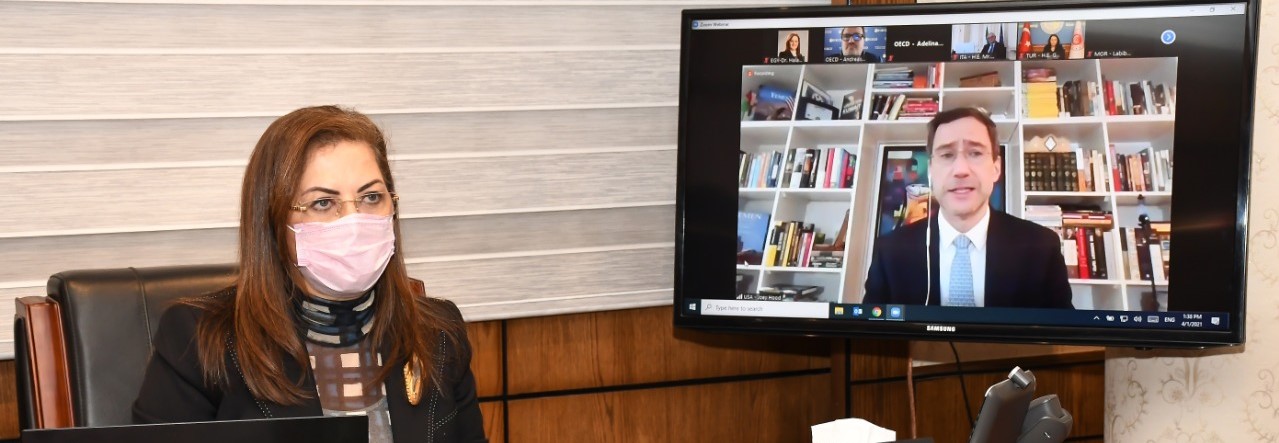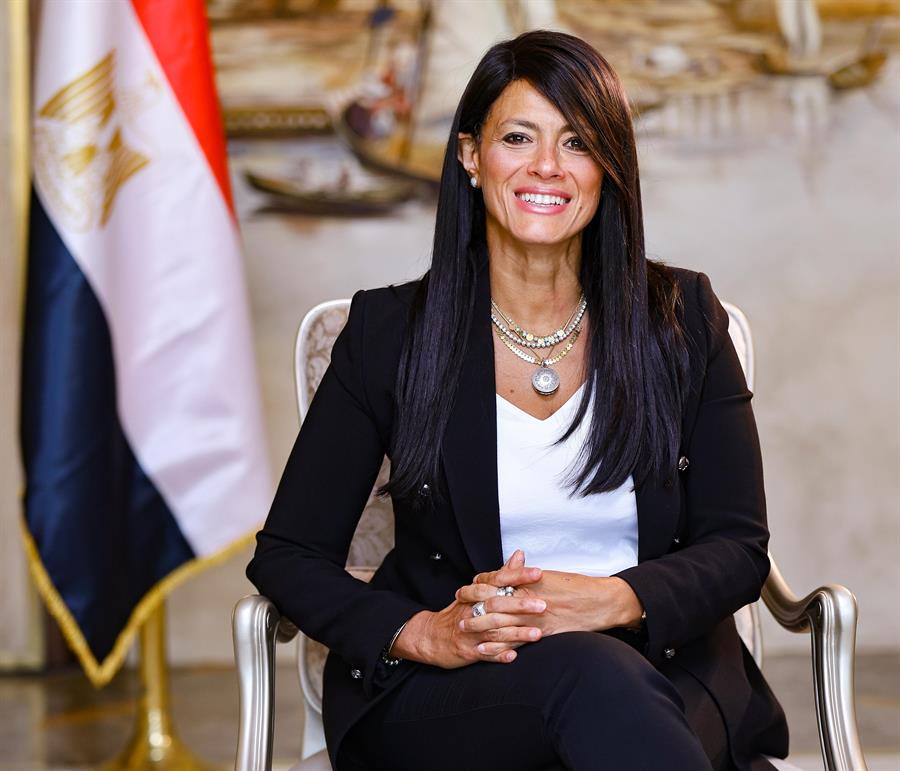Planning Minister participates as a keynote speaker in the MENA-OECD 2021 Ministerial Conference

02 April 2021
Dr. Hala El-Said, Minister of Planning and Economic Development, participated as a keynote speaker at the Ministerial Conference of the Governance and Competitiveness Initiative for Development in the Middle East and North Africa of the Organization for Economic Cooperation and Development (MENA-OECD) in the first session of the conference, titled "A New Growth Model for Recovery After Corona Pandemic: Governing Tomorrow's Investments in the MENA Region”.During her speech, Dr. Hala El-Said emphasized the success of the economic and social reform program launched by the Egyptian government in 2016, which was based on well-coordinated fiscal and monetary policies in addition to institutional and legislative reforms.
This program helped Egypt face the Covid-19 pandemic, and the state took many policies to confront the pandemic, including support for informal employment and support for the most affected sectors, which led to the reduction of the negative social and economic impacts of the epidemic.
El-Said indicated that the state is determined to move forward to complete the comprehensive and sustainable development and reform process, which includes implementing structural reforms to diversify the structure of the Egyptian economy, increasing its flexibility, and raising its ability to absorb external and internal shocks.
El-Said added that these reforms focus on diversifying and developing production patterns, improving the business and investment climate and environment to enhance the role of the private sector, and promoting technical education and vocational training, while laying the foundations for a productive knowledge-based economy, noting the importance of these reforms to include all governorates of Egypt.
El-Said emphasized the work to localize the sustainable development goals within the various governorates and take into account the competitive advantage of each governorate.El-Said added that these reforms and measures take a participatory approach between the government, the private sector, civil society, experts, and academics. This is to ensure that the reform program is inclusive of all parties and to work to uncover the current structural obstacles and to identify the precise areas for reforms to reach specific goals and performance indicators.Dr. Hala El-Said explained that within the framework of the work to encourage partnership with the private sector; the state established The Sovereign Fund of Egypt (TSFE) intending to optimize the state's assets and resources to maximize their value, give a strong impetus to the development and preserve the rights of future generations.
El-Said pointed out that the fund comes as a mechanism for cooperation between the public and private sectors and encouraging joint investment with local and foreign partners to create job opportunities for youth in Egypt and contribute to achieving sustainable development goals.El-Said pointed out that the Corona pandemic has created the need to enhance resilience and rearrange priorities.El-Said explained that the Egyptian state has increased investments in sectors with flexibility that can withstand crises, as the investment plan focuses heavily on human capital, especially in the health and education sectors, in addition to expanding social safety nets, pointing to the increase in investments in the communications and information technology sector by 300% to support the digital transformation process.Dr. Hala El-Said also referred to the importance of the transition to the green economy, which is a top priority for Egypt, noting that the fuel pricing reforms, investments in solar and wind energy complexes, and projects to convert gasoline-powered vehicles into natural gas, in addition to the shift towards public transport that runs on electricity.
El-Said confirmed the targeting of doubling green public investments, to reach 30% in 2021/2022 and then 50% over the next three years (2024/2025), pointing to Egypt launching its first green bonds, thus becoming the first country in the Middle East and North Africa region to issue green bonds.
On support and empowerment of Egyptian women, El-Said said that Egypt has taken unprecedented steps to emphasize support for empowering women, advance their rights, and highlight the vital role that Egyptian women play in developing the economy.El-Said stressed that women have become active partners at the executive level by occupying leadership positions in the state’s administrative apparatus. And the presence of women in powerful positions ensures that the gender equality perspective is included in policymaking.Dr. Hala El-Said emphasized that the successful implementation of reforms requires strong commitment and solidarity among all stakeholders from governments, the private sector, and civil society, through continuous coordination and effective communication.El-Said pointed to the importance of achieving rapid economic growth, provided that this growth be comprehensive and balanced, and this is reflected through the Egyptian government's efforts to localize the sustainable development goals in the governorates.El-Said pointed to the "Decent Life" initiative to help the neediest villages and improve the living standards of their residents. The new phase includes developing 1,500 villages to provide various services to the people of those villages.









